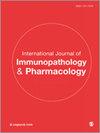Procollagen C-protease enhancer protein is a prognostic factor for glioma and promotes glioma development by regulating multiple tumor-related pathways and immune microenvironment
IF 2.6
3区 医学
Q3 IMMUNOLOGY
International Journal of Immunopathology and Pharmacology
Pub Date : 2022-05-01
DOI:10.1177/03946320221104548
引用次数: 1
Abstract
Objectives Glioma is a common type of brain tumor with high incidence and mortality rates. Procollagen C-protease enhancer protein (PCOLCE) has been shown to regulate tumor growth and metastasis in several cancers. However, the role of PCOLCE in glioma is unknown. This study aims to assess the association between PCOLCE and prognosis of glioma, and investigated the potential mechanisms. Methods The prognostic value of PCOLCE was determined using data from nine publicly available glioma cohorts. We also investigated the relationship between PCOLCE and glioma immune microenvironment and predicted response to immunotherapy based on the expression levels of PCOLCE. The potential roles of PCOLCE in glioma were also explored and validated in cell experiment. Results Survival analysis suggested that high-PCOLCE expression was associated with poor prognosis in glioma. Upregulation of PCOLCE enhanced an immune suppressive microenvironment in glioma by regulating immunocyte infiltration and Cancer-Immunity Cycle. Cox and ROC analysis revealed that PCOLCE was a prognostic factor for glioma and could be used to predict survival of the patients. Patients with low-PCOLCE expression were more likely to respond to Immunotherapy with ICI (immune checkpoint inhibitor) and survive longer. Enrichment analysis showed that PCOLCE was associated with multiple tumor-related pathways. Finally, we demonstrated that the knockdown of PCOLCE inhibited glioma development by regulating cell cycle and promoting apoptosis in in vitro experiments. Conclusion PCOLCE promotes glioma progression by regulating multiple tumor-related pathways and immune microenvironment and can be used as a prognostic factor for glioma.前胶原C蛋白酶增强蛋白是神经胶质瘤的预后因子,通过调节多种肿瘤相关途径和免疫微环境促进神经胶质瘤发展
目的胶质瘤是一种常见的脑肿瘤,发病率高,死亡率高。前胶原C蛋白酶增强蛋白(PCOLCE)已被证明可以调节几种癌症的肿瘤生长和转移。然而,PCOLCE在神经胶质瘤中的作用尚不清楚。本研究旨在评估PCOLCE与神经胶质瘤预后之间的关系,并探讨其潜在机制。方法利用9个公开的神经胶质瘤队列的数据来确定PCOLCE的预后价值。我们还研究了PCOLCE与神经胶质瘤免疫微环境之间的关系,并根据PCOLCE的表达水平预测了对免疫疗法的反应。PCOLCE在胶质瘤中的潜在作用也在细胞实验中得到了探索和验证。结果生存分析提示PCOLCE高表达与胶质瘤预后不良有关。PCOLCE的上调通过调节免疫细胞浸润和癌免疫循环增强了胶质瘤的免疫抑制微环境。Cox和ROC分析显示PCOLCE是神经胶质瘤的预后因素,可用于预测患者的生存率。PCOLCE表达低的患者更有可能对ICI(免疫检查点抑制剂)的免疫治疗产生反应,并存活更长时间。富集分析显示PCOLCE与多种肿瘤相关途径有关。最后,我们在体外实验中证明了敲低PCOLCE通过调节细胞周期和促进细胞凋亡来抑制神经胶质瘤的发展。结论PCOLCE通过调节多种肿瘤相关通路和免疫微环境促进胶质瘤的进展,可作为胶质瘤的预后因素。
本文章由计算机程序翻译,如有差异,请以英文原文为准。
求助全文
约1分钟内获得全文
求助全文
来源期刊
CiteScore
4.00
自引率
0.00%
发文量
88
审稿时长
15 weeks
期刊介绍:
International Journal of Immunopathology and Pharmacology is an Open Access peer-reviewed journal publishing original papers describing research in the fields of immunology, pathology and pharmacology. The intention is that the journal should reflect both the experimental and clinical aspects of immunology as well as advances in the understanding of the pathology and pharmacology of the immune system.

 求助内容:
求助内容: 应助结果提醒方式:
应助结果提醒方式:


